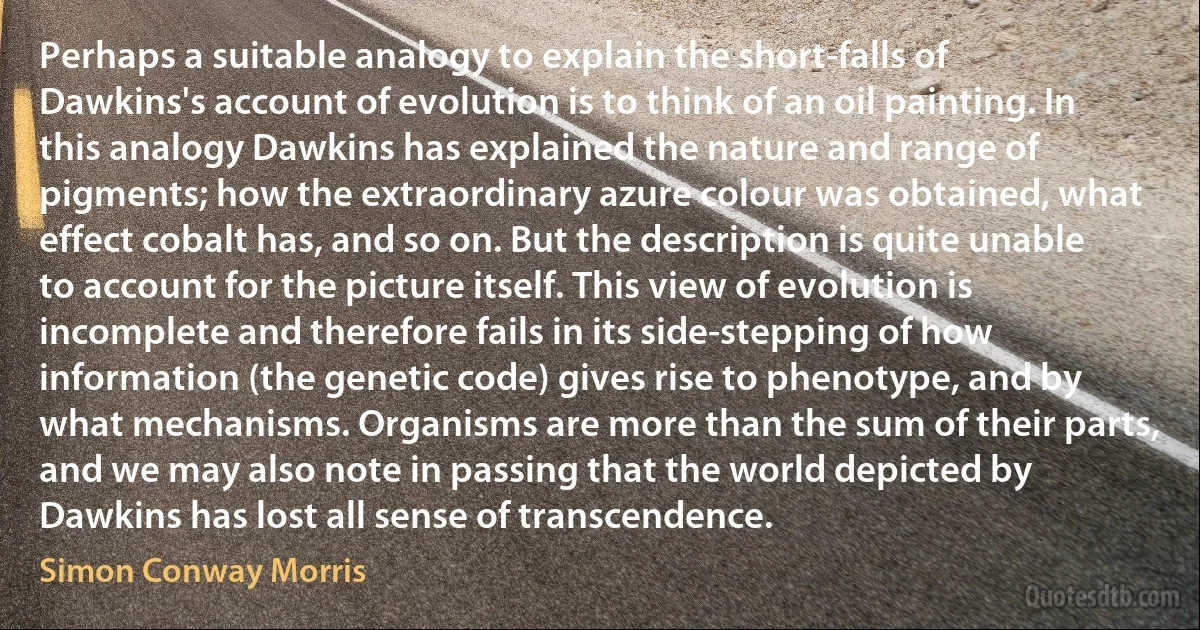
Perhaps a suitable analogy to explain the short-falls of Dawkins's account of evolution is to think of an oil painting. In this analogy Dawkins has explained the nature and range of pigments; how the extraordinary azure colour was obtained, what effect cobalt has, and so on. But the description is quite unable to account for the picture itself. This view of evolution is incomplete and therefore fails in its side-stepping of how information (the genetic code) gives rise to phenotype, and by what mechanisms. Organisms are more than the sum of their parts, and we may also note in passing that the world depicted by Dawkins has lost all sense of transcendence.
Simon Conway MorrisRelated topics
account azure code description evolution gives lost nature note oil passing perhaps picture quite rise sense think transcendence view world partsRelated quotes
Some students of philosophy have unreasonably high expectations of the subject. They expect it to provide them with a complete and detailed picture of the human predicament. They think that philosophy will reveal to them the meaning of life, and explain to them every facet of our complex existences. Now, although studying philosophy can illuminate fundamental questions about our lives, it does not provide anything like a complete picture, if indeed there could be such a thing. Studying philosophy isn't an alternative to studying art, literature, history, psychology, anthropology, sociology, politics, and science.

Nigel Warburton
I invariably, after great familiarity with a film, concoct a personal way of reading it that relies entirely on information which a public audience would, I feel, have scant interest. I might travel from a casual unrehearsed glance of a minor character to a detail of folded cloth, from a rhyme in the dialogue to an over-excited high note in the music, from a misplaced shadow to a patch of rogue colour, from a shine on a furniture leg to a curious accidental photographic haze around a street lamp, from the examination of a cloud that looks like a snail to the discomfort of an actress who I know is stifling a sneeze.

Peter Greenaway
I met him [Arshile Gorky] in 1929. Of course I met a lot of artists, but then I met Gorky. Well I had some training in Holland, quite a training, you know, The Academy. And then I met Gorky [in New York], who didn't have that at all, he became from no place [Tiflis, Armenia]... And for some mysterious reason, he knew lots more about painting, and art, he just knew it by nature - things I was supposed to know and feel and understand - he really did it better. He had an extraordinary gift for hitting the nail on the head, very remarkable, so I immediately attached myself to him and we became very good friends.

Willem de Kooning
The final truth about a phenomenon resides in the mathematical description of it; so long as there is no imperfection in this, our knowledge of the phenomenon is complete. We go beyond the mathematical formula at our own risk; we may find a model or a picture which helps us understand it, but we have no right to expect this, and our failure to find such a model or picture need not indicate that either our reasoning or our knowledge is at fault. The making of models or pictures to explain mathematical formulas and the phenomena they describe is not a step towards, but a step away from reality; it is like making a graven image of a spirit.

James Jeans
Quoted raw, a note in a bottle, this passage conveys, as any similar one similarly presented would do, a fair sense of how much goes into ethnographic description of even the most elemental sort - how extraordinarily "thick” it is. In finished anthropological writings, including those collected here, this fact - that what we call our data are really our own constructions of other people's constructions of what they and their compatriots are up to - is obscured because most of what we need to comprehend a particular event, ritual, custom, idea, or whatever is insinuated as background information before the thing itself is directly examined.

Clifford Geertz
